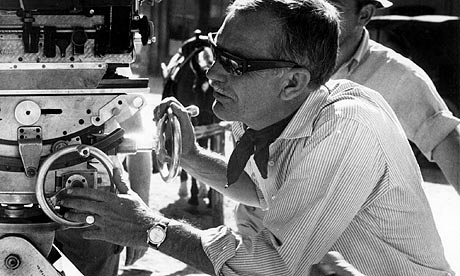
Inside the head of Sam Peckinpah
So the great
director's films are about violence? Not really. Are they about honour? Hardly.
In fact, says Rick Moody, Sam Peckinpah offered us realism - albeit of a very
particular kind
Rick
Moody
The Guardian, Thursday 8
January 2009
'Undisputed poet of
alcoholic cinema' ... Sam Peckinpah on the set of The Wild Bunch. Photograph:
Ronald Grant Archive
"Now, most funeral orations, Lord, lie about
a man," - so says David Warner, in his memorable turn as Joshua, the
fraudulent preacher in Sam Peckinpah's The Ballad of Cable Hogue, from 1970.
The same can be said of most film criticism - that it dissimulates or
exaggerates about the film, about the director, about the movement, about the
art. So let's aspire in this revisionist essay on Peckinpah to tell the truth.
Although it's worth noting that when you believe what characters say in a
Peckinpah film, you play right into the director's malevolent hands.
.
Nevertheless, the first point that must be made,
here in the 21st century, is that Peckinpah's films are not terribly violent.
That's how he made his reputation: as "Bloody Sam", the man who never
met a bucket of theatrical blood he wasn't willing to splash around, and who
always made certain you knew when the blood was about to flow, by means of slow
motion. Still, by today's standards, the better part of the Peckinpah canon is
not terribly violent - not when judged against today's rivers of gore. There
are, in Peckinpah, no fountaining bodies, no bits of brain tissue splattered
about. Anything released in the last 20 years is quite a bit more repellent.
Seen any of those Saw movies?
Ride the High Country is a good place to start
for the uninitiated. Released in 1962, it scarcely departs from the western as
we understand it. There's the good guy, Steve Judd, and the bad guy, Gil
Westrum, and they behave according to type for the first reel, at least until
they get into the business of saving a young, impetuous romantic (the very
first film role of Mariette Hartley) from her up-country fiance. Then the good
guys and bad guys get curiously admixed, till it is hard to tell which is
which. Indeed, Hartley's impetuous tomboy and Randolph Scott's old cowpoke
have, toward the end, an exchange on the ubiquity of gray areas between right
and wrong.
This exchange could serve as a template for the
morality of the entire Peckinpah oeuvre. Still, the threatened gang rape in
High Country happens mainly by implication, and there is little here of
Peckinpah, master of the high-noon showdown. Even in the midst of the climactic
shootout, the camaraderie between the "bad" Westrum and the "good"
Scott, as they pick off a posse of far worse mountain men, is anything but
removed from the western genre. The shootout involves a lot of grimacing, and
there is ample time, despite perforations, for Scott's last pronouncements.
After which the orchestra swells!
for the rest go here:
http://www.theguardian.com/film/2009/jan/09/sam-peckinpah-retrospective
http://www.theguardian.com/film/2009/jan/09/sam-peckinpah-retrospective

No comments:
Post a Comment